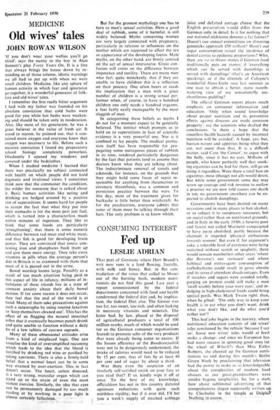MEDICINE
Old wives' tales
JOHN ROWAN WILSON
'If you don't -wear your wellies you'll go blind', says the nanny to the boy in Alan Bennett's play Forty Years On. It is a line that always brings the house down by re- minding us of those solemn, idiotic warnings we all had to put up with when we were small children. Medicine, like any sphere of human activity in which fear and ignorance go together, is a wonderful generator of folk- lore and old wives' tales.
I remember the first really bitter argument
I had with my father was founded on his absolute conviction that cold baths were good for you while hot baths were weaken- ing and should be taken only in moderation. Also, like most of his generation, he was a great believer in the value of fresh air. It stood to reason, he pointed out, that it con- tained more oxygen and everyone knew that oxygen was necessary to life. Before such a massive conviction I found my preparatory school biology completely powerless. Obediently I opened my windows and cowered under the bedclothes.
When I studied medicine I learned that there was practically no subject connected with health on which people did not hold dogmatic and irrational views. I sometimes think now that the commoner the condition, the wilder the nonsense that is talked about it. Basic human activities like eating and drinking are hedged around by a positive riot of superstitions. It seems hard for people to accept the fact that what they put into their stomachs is for the most part just fuel, which is turned into a characterless mush within minutes of ingestion. They like to think that some foods are particularly 'strengthening', that there is some esoteric difference between red meat and white meat, and that fish is good for developing brain power. They are convinced that tonics con- taining iron and phosphates buck them up and give them more energy. They take extra vitamins in pills when the average person's diet in Britain is so crammed with them that most of it is passed out in the urine.
Bowel worship looms large. Possibly as a result of too much attention being paid to this aspect of life in infancy, millions of in- habitants of these islands live in a state of constant anxiety about their daily bowel motion. If for some reason it does not occur, they feel that the end of the world is at hand. Many of them take precautions against such a catastrophe by using routine laxatives to 'keep themselves cleaned out'. This has the effect of so flogging the natural intestinal reflex that it eventually becomes punch drunk and quite unable to function without a daily fix of a few tablets of cascara sagrada.
Many of these obsessional attitudes arise from a kind of misplaced logic. One can visualise the kind of oversimplified reasoning which leads to the idea that the blood is fortified by drinking red wine or purified by taking aperients. There is also a firmly-held belief that a normal heart can be in some way strained by over-exertion. This in fact doesn't occur. The heart, unless diseased, is a very strong, muscular organ which can stand up to the strain of even the most violent exercise. Similarly, the idea that eyes can be permanently damaged by too much reading or by working in a poor light is almost certainly fallacious. • But for the grossest mythology one has to turn to man's sexual activities. Here a good deal of rubbish, some of it harmful, is still widely believed. Myths concerning women are very largely connected with pregnancy, particularly in relation to influences on the mother which are supposed to affect the sex or appearance of the developing foetus. Male myths, on the other hand, are firmly centred on the act of sexual intercourse. Great con- fusion still exists on the difference between impotence and sterility. There are many men who feel, quite mistakenly, that if they are unable to have children this is a reflection on their potency. One often hears or reads the implication that a man with a great number of children is a strong sexual per- former when, of course, to have a hundred children one only needs a hundred orgasms, a feat fairly easily manageable by the most sluggish of men.
In categorising these beliefs as myths I do not for a moment expect to be generally believed. The instinct which prompts us to hold on to superstitions in face of scientific evidence is a very powerful one. Nor is it confined to lay people. The medical profes- sion itself has been responsible for pro- pagating some outrageous pieces of rubbish in its time, rendered particularly dangerous by the fact that patients tend to assume that doctors know what they are talking about. The indiscriminate removal of tonsils and adenoids, for instance, on the grounds that they might hold some focus of sepsis re- sponsible for anything from rheumatism to coronary thrombosis, was a common and pernicious practice between the wars. To this day, most of the treatment given for backache is little better than witchcraft. As for the psychiatrists, everyone admits that some of them must be talking through their hats. The only problem is to know which.


































 Previous page
Previous page